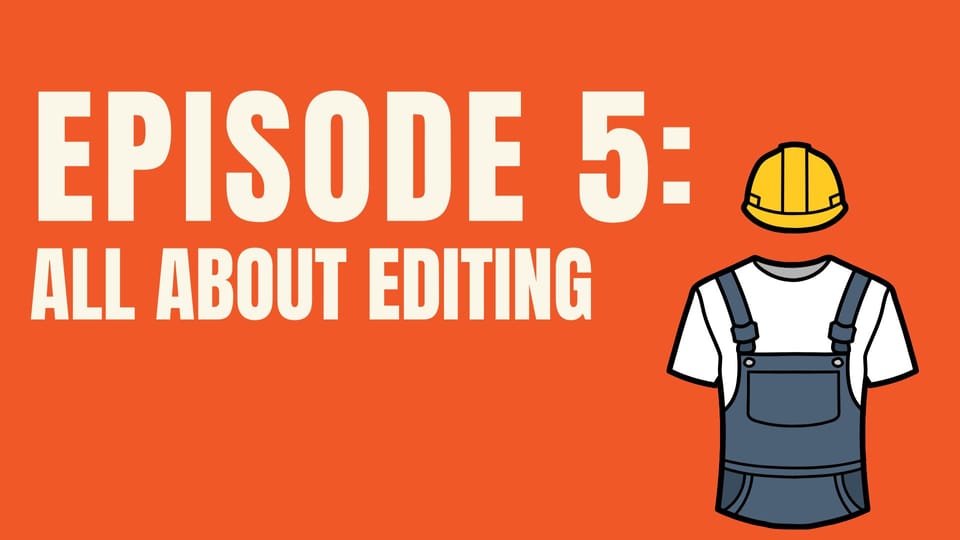EP05: All About Editing

Expensive & essential, today we will talk about the beloved & dreaded e-word.
"I don't need an editor." These are words I've heard a million times in the past six months operating my business at ex42. When I tell potential clients I don't work with books that aren't professionally edited, I get hung up on quite a bit. We authors often fail to understand how necessary it is to have a professional editor with a deep understanding of the commercial industry looking at our work through the required lenses.
We expect them to have stuffy reading glasses on, draw all over our beloved plot and characters with a red pen, and mutter utterances of "good" and "not good" all over the page. Was that really worth two thousand dollars?
While our editors are looking to improve our manuscripts, they are also viewing the body of work through a well-researched lens that we cannot see from our vantage point. They are asking the well-informed questions line-by-line: "Will this sell?" and, if not, "How can we change this to make it sell?"
And that, my PubHyp friends, is the type of editing that can take a book from decent to #1 Bestseller. We can't skimp out on getting good editors. They are a business decision—one of the most important ones you'll make.
Types of Editors and Their Average Costs
There are many specialty editors in this book world, and their costs vary greatly. Let's talk about what you need, what you can skip, and what you will absolutely not be able to go on without. (Promise me now, Rose, and never let go of that promise!)
🔨 Developmental Editors ($0.03-$0.08/word)
At first glance a few cents per word doesn't seem like much, but when you do the math on a book over 100k words...it can get pricy! However, developmental editors are well worth the cost.
What they do: Dev editors assess the manuscript overall, helping you work on story structure, plot holes, character arcs, scene pacing, and all the other important things that separate a good story from a great story.
What they don't do: Dev editors do not typically edit dialogue, formatting, prose, or correct grammatical errors.
When to find one: You can find a developmental editor as early as the completion of the first draft (Although we recommend rewriting your draft a few times first). Dev editors are used to spelling mistakes here and there & you don't need to worry about having the book super polished before it goes in front of them. A dev editor should be the first type of editor you book and/or work with.
How many do I need? You only need one good developmental editor, but you might want to negotiate multiple editing rounds with them.
💬 Line Editors ($0.02-$0.04/word)
Line editors are like stagehands who wear all black during a Broadway show. They move set pieces around like magic, make lights turn on at the right time, and so forth. They tend to be more popular in fiction rather than nonfiction, although they're equally valuable to both.
What they do: A line editor's job is to ensure your dialect, tone, & structure flow together nicely. They'll look at dialogue, speech, & sentence flow to ensure your words are cohesive. A book is a huge body of work that we write over various moods, timelines, and stress levels. Naturally, this will cause inconsistencies in the book. (Ever noticed Character Sally is acting a little brattier when your kids are on a break from daycare? Just kidding.) Under a line editor, the tone of the book and of each character are "in line" and consistent.
What they don't do: Any plot editing or changing the direction of the story/plot itself. Occasionally, line editors will also bundle proofreading services, however.
When to find one: After developmental editing rounds one and two. After the book has been rewritten at least twice.
How many do I need? Just one!
🔏 Copy Editors & Proofreaders ($0.01-$0.03/word or Fixed Fee between $500-$1000)
Copy editors and proofreaders are what most people think of when they hear the word "editor." This is great because the more copy editors there are in the world, the fewer mistakes we end up with.
What they do: At the most basic level, they remove obvious grammatical mistakes without touching protected dialect, speech, or "sensibility" in your manuscript. Many authors think they can get by with Grammarly, but unfortunately, that is typically not the case. While I love Grammarly, AI won't understand certain structures or quips in your manuscript and can be dangerous when it comes to overriding your tone & "voice" as a writer.
What they don't do: Any plot editing or story structure changes. Occasionally, copy editors will also bundle line editing services, however.
When to find one: After developmental editing is 100% complete and line editing is done.
How many do I need? ex42 recommends at least two or negotiating a twice-over proofread with the same editor.
What are the secrets to getting a perfect editor?
There are a lot (and I mean a lot) of self-proclaimed editors out there who will pocket your dollar with little to no credibility. Here, we'll share a few tips and tricks on how to find reputable editors and some of our vetted sources.